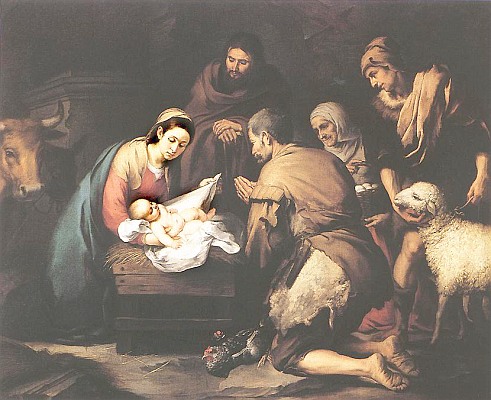By Father Brian Doerr
|
* First Day * Second Day * Third Day * Fourth Day * Fifth Day * Sixth Day * Seventh Day * Eighth Day * |
From the Latin word, Octava, comes the ancient practice of celebrating Christmas for eight wonderful days. We would like to invite you to join our parish in allowing Christmas its proper observance – by continuing the celebration for eight days. We are celebrating the Word made Flesh! Can we properly celebrate this unfathomable mystery in just one morning? By observing the Octave, we hope to “re-order” our Christmas observance, quite frankly, away from the modern American practice of celebrating Christmas during December (when the Church observes Advent) while disregarding the Christmas Season. By December 26, the candles are snuffed, the weight has been gained, and we cast a forlorn look toward spring as so many are burned-out on reindeer, elves and candy canes. 
We would like to assist your family in their return to the ancient practices of this worthwhile observance and root them more firmly in the Christian tradition. Respect is due to the practices you and your family have developed at home. The traditions you have developed are not, in some way, incorrect. Yet, adopting some of these practices suggested below will unite your family to the traditions and customs observed for centuries by our Catholic ancestors.
Why celebrate for eight days? The practice actually is as ancient as the Old Testament. The Hebrew people observed many of their feasts for a period of eight days. The “Feast of Tabernacles” and the “Dedication of the Temple” are two of the more notable. Later, the Roman Emperor Constantine continued the tradition by celebrating the dedication of basilicas in the Christian World for the same period of eight days. Prior to the Second Vatican Council, which closed in 1965, the Church granted certain feasts the dignity of an octave. In addition to the more prominent liturgical observations of Easter, Pentecost, Epiphany, the feasts of Sts. Peter and St. Paul, St. Lawrence, and St. Agnes were observed. Today we celebrate two feasts with Octaves: Easter (being the more prominent) and Christmas.
Again, so why celebrate for eight days? Life in the ancient world was so hectic and filled with pressure and families had grown apart and were being swept up in the older pagan traditions, the Church granted a period of eight days in order to contemplate the mysteries experienced in the Church’s liturgy. Comparatively speaking, we obviously need the Octave even more than the Christians of the ancient world! The ancient world did not have television, shopping malls, computers, telephones, fast food, automobiles, magazines and newspapers… if the Ancients were busily distracted, what has become of us!? We need to enjoy this time! If you need, take off work, visit family, feast, attend Mass, praise God, visit the poor, celebrate charity, and most of all be humbled before the Mystery: The Word of God has become man!
December 25; the First Day of the Christmas Octave, the Nativity of the Lord
Opening Prayer from the Liturgy: “Father, we are filled with the new light by the coming of your Word among us. May the light of faith shine in our words and actions. Grant this through our Lord Jesus Christ, your Son, who lives and reigns with you and the Holy Spirit, one God, for ever and ever. Amen.”
In your Bible: Luke 2:1-14; the Story of the Nativity
Catechesis: Recently, Pope Benedict XVI encouraged his flock to overcome the “commercial contamination” of Christmas by rediscovering the Child Jesus, the Son of God made man out of love. There is nothing like a bit of guilt for Christmas morning! Yet, everyone mumbles to him or herself that “next year, we are going to cut back.” And every year, the commercial aspect of Christmas reigns out of control. The Holy Father wants us to experience the fullness of the Church’s celebration: “The authentic spirit of Christmas is, “he said recently, “characterized by recollection, sobriety, a joy that is not exterior but profound.”
Activity: To regain the true meaning of our observance, the Holy Father suggested we focus on the tradition of placing a Nativity crib in our homes as a way of teaching the Christian faith, especially to children. Pope Benedict XVI encourages us to continue the custom of placing the crib in the home, as it “can be a simple but effective way of presenting the faith and transmitting it to one's children. The manger helps us to contemplate the mystery of God's love who revealed himself in the poverty and simplicity of the Bethlehem cave.” If you do not have a crib, take some time today to make one or use a Christmas greeting card. Otherwise, sometime today, gather around the crib to sing, to pray and to adore the Christ child.

